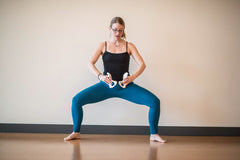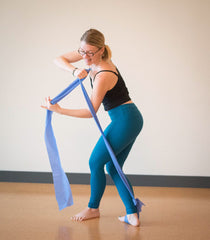A Letter to Yogis: A lesson through injury (Part 1)
By Alison Wesley, Franklin Method Faculty
DECEMBER 2019
Dear Yogis,
I too have felt mystified and confused by the pelvis in asana. I too have felt frustration with my hips, my lower back, and my S/I joints.
I spent 16 years trying to “tuck my tail.” Trying to “narrow my hip points.” Trying to “blossom my sit bones” (whatever that means). Trying to “engage my core.”
I practiced my yoga daily, diligently, and I did exactly what the teacher said. In fact, I overdid what the teacher said. If I heard the cue “lengthen your tailbone” every day, then every day, I did it a little more than the time before—because somewhere deep down, I felt like I hadn’t completely done it yet. I also mistakenly thought all the little microadjustments we made in asana should be the same microadjustments in daily life. I stood in line and practiced tadasana (mountain pose) as I understood it: one tall posture of stacked joints, held statically in place.
Then one morning, seemingly out of nowhere, I went to get out of my car and felt a pain like I had never experienced before. I couldn’t move. I had to be carried away to the hospital, where they told me I had two badly herniated discs. The doctor assumed I had been in a traumatic accident, but nope… just living my life as a 32-year-old yoga teacher.
He showed me the pictures of the inside of my body, told me I should never practice yoga again, and he said I would need a spinal surgery that would probably lead to more surgeries. He diagnosed me with degenerative disc disease. I left the hospital with lots of drugs (that I never took) and a lot of confusion. How could this be? I was a yogi! I had been doing all the right things!
The first thing I did was go to physical therapy, where I was told to lie on my abdomen and not move for 10 days, which I did. I was so bored and wanted to move so badly but instead I opened a book on yoga therapy. I saw a vivid description and image of the way the pelvic floor can be imaged as a fan. While looking at this image, for a moment, my pain subsided. I ordered that book right away, along with Dynamic Alignment Through Imagery, also by Eric Franklin.
By the time the books arrived, I was already in the next phase of physical therapy, which involved some very simple movements. I was so happy to be moving again. I had learned to change a few things I did often, like picking things up from the floor, putting a leash on my dog, and getting in and out of bed. But there was still numbness, pain, and nerve sensations in my leg and foot.
I opened Dynamic Alignment Through Imagery and turned to a page on the spine (page 492 if you’re curious). I saw a beautiful image of the spine as a series of corks in the water, with the water representing the disc space. I had believed the disc space to be diseased in my own body. But here it was, beautiful. Fluid. Free. I felt it. For just a moment, I felt complete relief, and my posture shifted just a bit. I wasn’t engineering anything. I just saw my spine as a series of corks floating amid water. Without reading anything further, I knew I would sign up for the Franklin Method teacher training and did so a few months later.
Much has changed since those early days. I can feel my leg and have no nerve pain. I never had spinal surgery. Am I embodying perfect functional movement 100 percent of my day? Probably not. But my teaching is different. My movements are different. My practice is different. (I even do forward bends with a blend of hip flexion and spinal flexion now instead of only “hinging at my hips” like I used to, which may be what put pressure on those two beautiful discs over and over.)

And, yes, this all takes time. It takes interest. It takes focus.
Stay tuned on Human Kinetics’ Dance Blog for the rest of the story of how my journey from my injury has influenced how I teach and help others to embrace the imagery of functional movement to maximize their yoga, dance, or other movement performance.


Latest Posts
- Incorporating Musical Learning into Beginning Dance Classes - Part 2
- Incorporating musical learning into beginning dance classes
- Celebrating the dance contributions of women dancers
- Review of Essentials of Dance Psychology by Dr. Jenny Seham
- Inspiring Creativity - External Focus of Attention in Practice
- Review of Music Education for Dancers Online Course


